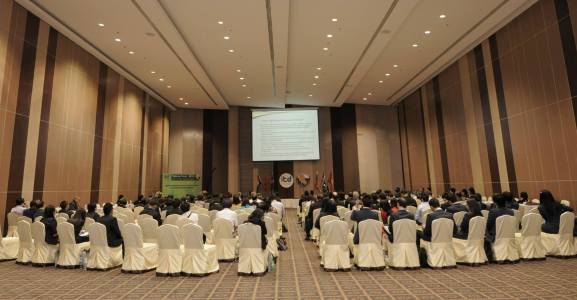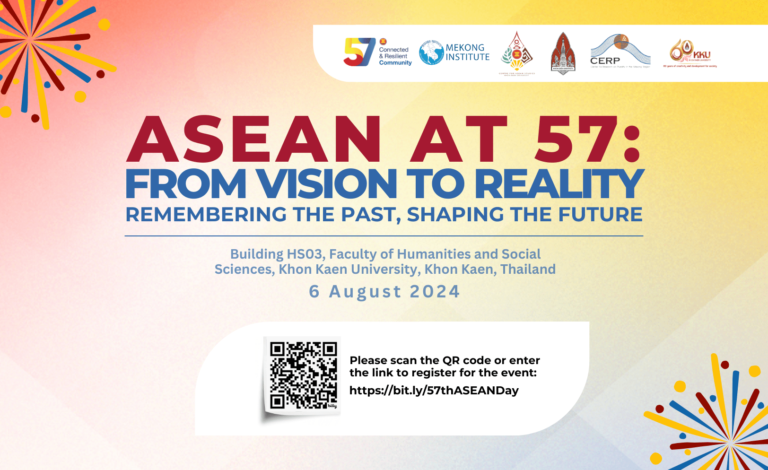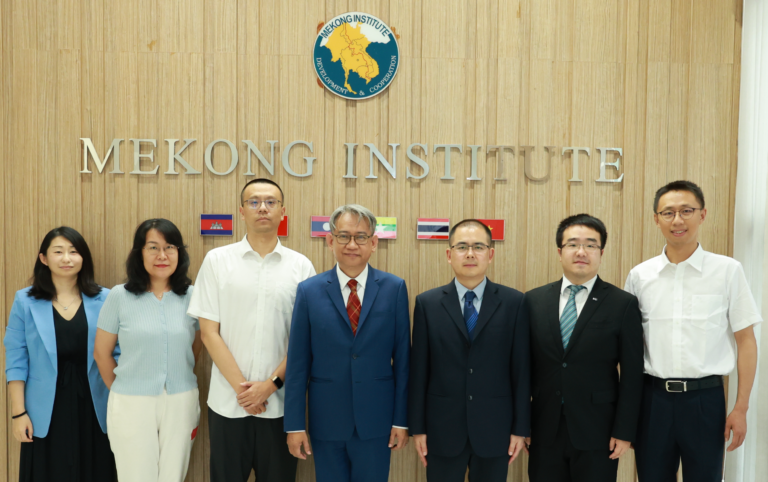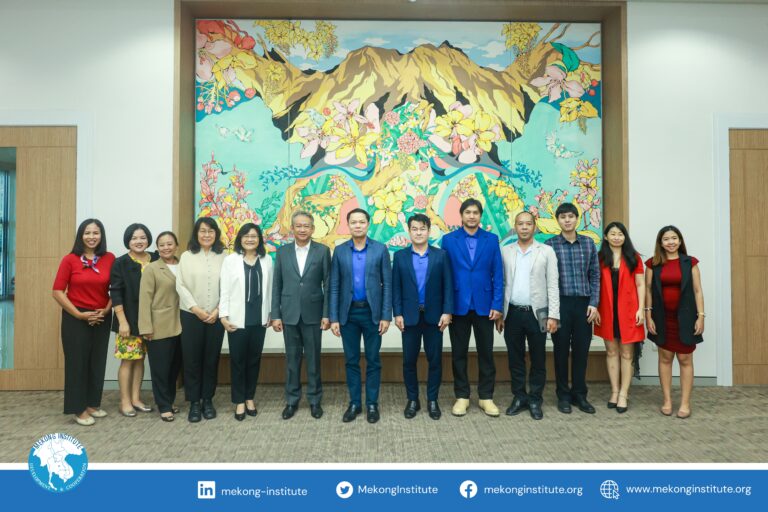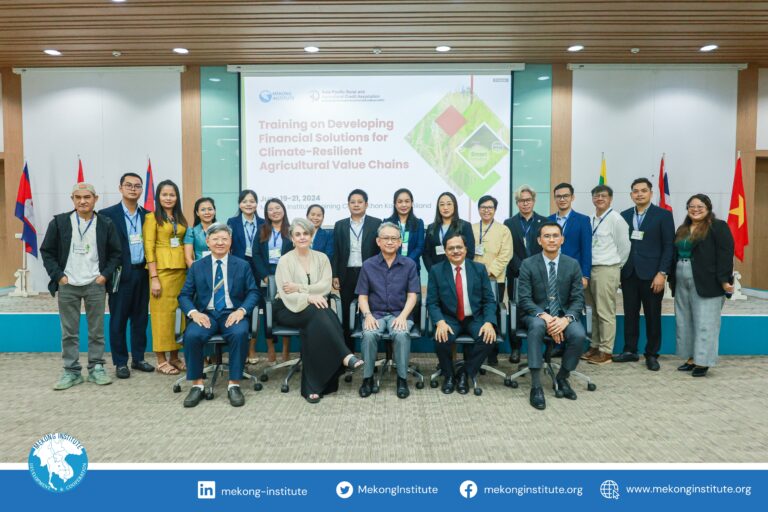The Mekong Sub-region (GMS) is in the midst of massive change, both economically and socially. Over the past two decades, the GMS Economic Cooperation Program (GMS ECP) has paved the way for accelerated economic growth and the emergence of the GMS as a global hub of trade and investment. Economic and social development, however, has been unequal and core sections of society – particularly agricultural producers and rurally-based SMEs – are struggling to adapt to the new, more diversified and competitive economic environment.
To support the GMS ECP’s vision for ‘more integrated, prosperous and equitable growth’ in the region, and to prepare its human resources and communities for new, more competitive economic realities, the Mekong Institute (MI) and the International Institute for Trade and Development (ITD) co-organized the, ‘Mekong Forum 2013: ‘Towards More Inclusive and Equitable Growth in the GMS,’ on July 11-12, at the Centara Hotel and Convention Center in Khon Kaen, Thailand.
The Mekong Forum 2013 served as a platform for a range of notable senior policy makers, business and civic leaders, academic experts and development practitioners interested and involved in the GMS Economic Cooperation Program (GMS ECP) and the ASEAN Economic Community (AEC) to come together in a multi-lateral, multi-level environment to define appropriate measures and plans to support positive gains made by regional development efforts.
“Having worked on ‘Mekong issues’ for many years, we’ve developed the human resources and capacity to accelerate sustainable development,” explained renowned economist and MI Steering Committee Chairman, Dr. Narongchai Akrasanee. “At the moment, GMS countries have been doing very well in terms of growth. We are seeing physical connectivity taking place in many areas and at many locations” he explained further, “but we are facing an increasing number of cross-border issues. These issues cause – and are related to – a range of problems such as drugs, human trafficking and so on. Cross border issues must therefore be an area of emphasis moving forward.”
The event, which drew over 200 participants, featured speeches and presentations on a range of critical social, economic and connectivity development- issues emphasizing more inclusive and equitable development throughout the entire GMS region. Speeches during the first morning session included those by well-known GMS development authorities such as Dr. Narongchai Akrasanee, Mr. Gao Shuxun, H.E. Winston Set Aung, Mr. Thongphane Savanphet, and Dr. Melanie Milo.
“High growth rates do not mean everyone is better off automatically,” reflected ITD Deputy Director, Watcharas Leelawath on the motivation behind the Mekong Forum 2013. “Some, especially the poor, are not included. It is a must that we find ways and means to ensure that each and every one of us gets a fair share and equally enjoys the benefits of good economic performance in our sub-region.”
The Mekong Forum 2013 included three facilitated panel discussions focusing on (1) improving agricultural productivity, (2) developing more efficient and effective national and regional business facilitation and development services for SMEs, and (3) facilitating the freer cross-border movement of labor and standardized mutual skill recognition arrangements.
Discussion sessions culminated in the formation of policy recommendations for each focus area which will soon be submitted to the GMS Senior Official Meeting for consideration. Policy recommendations will also be utilized by MI, ITD, and collaborating partners as the basis for developing future regional development projects and initiatives.
The 2013 Mekong Forum follows on from the success of the ‘2011 Mekong Forum: From GMS to AEC 2015: Prospects for Human Resource Development and Capacity Building in Regional Cooperation and Integration’, which saw over 80 representatives of international organizations, regional government agencies, private sector and civil society organizations form three indicative plans of action to narrow development disparities between the less developed Mekong countries and other ASEAN states. The 2013 Mekong Forum builds on MI’s growing role in regional cooperation and integration which now extends to implementing sub-regional development projects along the GMS Economic Corridors.
The Mekong Sub-region (GMS) is in the midst of massive change, both economically and socially. Over the past two decades, the GMS Economic Cooperation Program (GMS ECP) has paved the way for accelerated economic growth and the emergence of the GMS as a global hub of trade and investment. Economic and social development, however, has been unequal and core sections of society – particularly agricultural producers and rurally-based SMEs – are struggling to adapt to the new, more diversified and competitive economic environment.
To support the GMS ECP’s vision for ‘more integrated, prosperous and equitable growth’ in the region, and to prepare its human resources and communities for new, more competitive economic realities, the Mekong Institute (MI) and the International Institute for Trade and Development (ITD) co-organized the, ‘Mekong Forum 2013: ‘Towards More Inclusive and Equitable Growth in the GMS,’ on July 11-12, at the Centara Hotel and Convention Center in Khon Kaen, Thailand.
The Mekong Forum 2013 served as a platform for a range of notable senior policy makers, business and civic leaders, academic experts and development practitioners interested and involved in the GMS Economic Cooperation Program (GMS ECP) and the ASEAN Economic Community (AEC) to come together in a multi-lateral, multi-level environment to define appropriate measures and plans to support positive gains made by regional development efforts.
“Having worked on ‘Mekong issues’ for many years, we’ve developed the human resources and capacity to accelerate sustainable development,” explained renowned economist and MI Steering Committee Chairman, Dr. Narongchai Akrasanee. “At the moment, GMS countries have been doing very well in terms of growth. We are seeing physical connectivity taking place in many areas and at many locations” he explained further, “but we are facing an increasing number of cross-border issues. These issues cause – and are related to – a range of problems such as drugs, human trafficking and so on. Cross border issues must therefore be an area of emphasis moving forward.”
The event, which drew over 200 participants, featured speeches and presentations on a range of critical social, economic and connectivity development- issues emphasizing more inclusive and equitable development throughout the entire GMS region.
Speeches during the first morning session included those by well-known GMS development authorities such as Dr. Narongchai Akrasanee, Mr. Gao Shuxun, H.E. Winston Set Aung, Mr. Thongphane Savanphet, and Dr. Melanie Milo.
“High growth rates do not mean everyone is better off automatically,” reflected ITD Deputy Director, Watcharas Leelawath on the motivation behind the Mekong Forum 2013. “Some, especially the poor, are not included. It is a must that we find ways and means to ensure that each and every one of us gets a fair share and equally enjoys the benefits of good economic performance in our sub-region.”
The Mekong Forum 2013 included three facilitated panel discussions focusing on (1) improving agricultural productivity, (2) developing more efficient and effective national and regional business facilitation and development services for SMEs, and (3) facilitating the freer cross-border movement of labor and standardized mutual skill recognition arrangements.
Discussion sessions culminated in the formation of policy recommendations for each focus area which will soon be submitted to the GMS Senior Official Meeting for consideration. Policy recommendations will also be utilized by MI, ITD, and collaborating partners as the basis for developing future regional development projects and initiatives.
The 2013 Mekong Forum follows on from the success of the ‘2011 Mekong Forum: From GMS to AEC 2015: Prospects for Human Resource Development and Capacity Building in Regional Cooperation and Integration’, which saw over 80 representatives of international organizations, regional government agencies, private sector and civil society organizations form three indicative plans of action to narrow development disparities between the less developed Mekong countries and other ASEAN states. The 2013 Mekong Forum builds on MI’s growing role in regional cooperation and integration which now extends to implementing sub-regional development projects along the GMS Economic Corridors.


